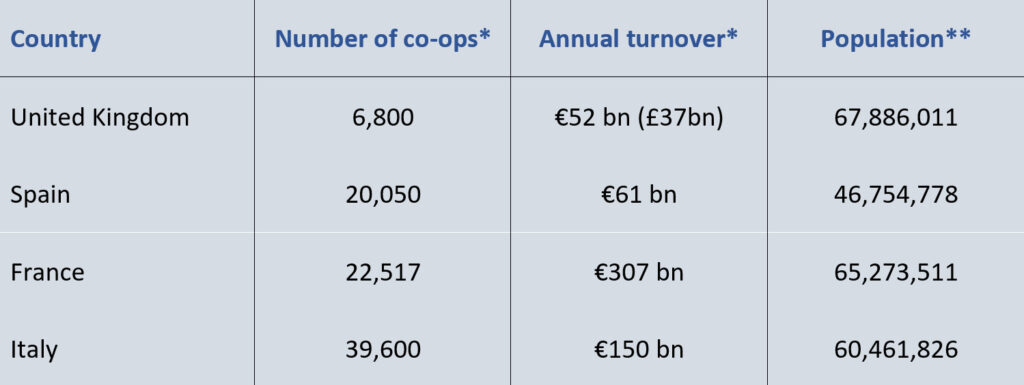Report paves the way for a stronger co-operative sector after the economic devastation of Covid-19, with directions for government to rebuild a fairer, more resilient and sustainable economy.
Co-operatives UK policy director James Wright puts forward the case for a more mutual future post-pandemic.
The economic crisis brought on by Covid-19 is steadily
gathering pace. Stories are appearing thick and fast, like the epic 20.4%
drop in the UK’s April GDP, the predicted surge in unemployment to 3.5
million by the end of the year and the suggestion in leaked treasury
documents that the total cost to the public purse this year could reach £337bn.
There are similar stories being told across the globe. The International
Monetary Fund has described the global coronavirus crisis as causing the “worst
economic fallout since the Great Depression” of the 1930’s, and the
pandemic’s pecuniary punch has already put the financial crisis of 2008 in the
shade.
These huge upheavals are cracking the foundations of our economy – parts of it are certain to fall. Determined to see mutual businesses playing a larger part in the new economy that rises from the ruins of the old, Co-operatives UK have released a report which provides a road map for rebuilding a stronger, more stable and fairer economy. “We are the rebuilders: four co-operative offers for building back better from Covid-19” argues that co-ops are crucial to enabling our country and local communities to “build back better” from the economic devastation of Covid-19.
James Wright is the policy director at Co-operatives UK, the Manchester-based national representative body for co-operatives, and an author of the new report. Speaking to The Meteor, Wright described how the current crisis has emphasised the importance of co-ops in creating a better economy.

“Co-operatives were needed massively before; what the Covid-19 crisis has done is drawn more attention to pre-existing crises and problems which co-ops could help address. So, for example, inequalities in wealth, power, opportunity. Those were major issues before, but Covid-19 seems to have shone a light on it a little bit more. You know, the sense that workers don’t get a fair deal, that some people’s lives are much easier and more privileged than others… We see co-ops as part of the tool kit for making an economy that is better at distributing the value and the wealth that we create.”
Co-op sector has plenty of room to grow in UK
The UK is the birthplace of the modern co-operative movement, which is widely attributed to the founding of the Rochdale Society of Equitable Pioneers in 1844. Yet the UK lags far behind other European peers such as Italy, France and Spain in the size of its co-operative sector contribution to the economy.

In 2020 less than 1% of businesses in the UK are co-ops, according to the Rebuilders report. In March 2020 there were over 4 million active conventional companies on the Companies House Register. According to Wright this is fundamentally due to:
“Co-ops going against the established way of doing most things in the economy…Worker ownership and control of business is not an established way of owning a business…Community ownership of land and assets is not an established way of organising and running those resources…This is a barrier to overcome, which is compounded by the fact that the ecosystem that exists for people to set up and run businesses makes doing something different even harder.”
To compound the problem of the dominant ingrained economic/business culture, public awareness of what co-operatives are and their benefits is low. The legislation and structures for setting up and supporting co-ops in the UK are also insufficient to enable growth, says Wright. All these factors are severely limiting co-op development in the UK. He says more thought and action needs to go into developing the co-operative sector in the UK:
“…in the same way as you might find in Italy and France, where they have got both the legislation and the institutional frameworks that have been developed to really support co-op growth in quite a considerable way.”
The rebuilders report presents four co-op offers, that provide strategies the government can take, to help the “UK build back better” from the Covid-19 crisis. For each offer a summary is provided for work already underway to promote that offer and advice on what local and national governments should do to support it:
- Offer 1: Create decent new livelihoods
- Offer 2: Keep viable jobs in communities
- Offer 3: Breathe new life into local assets and enterprise
- Offer 4: Convert newfound community spirit into transformative social action

Community-led economic development
A key ask for government in offers one, three and four is that they do more to support community-led economic development (CLED). This human–centred design approach to developing economic plans empowers the people that those plans will eventually affect, giving them an element of control over their economic destiny. Wright explained why this is a key point in the report:
“It’s a process that brings together local businesses, residents and community organisations to try and effect positive change in their local economy, almost always with sustainable and inclusive economic development as the objective, rather than growth at any cost or anything like that.”
The process can be used for many different projects including enterprise support, changes or development of infrastructure, skills training and a whole host of things you might see in an economic development plan, Wright says, except that it has, “communities of place and interest in the driving seat, rather than business networks and groups of investors and think tanks.”
When asked if he had the power what three things he would change first to promote co-op-development, Wright picked CLED as being the first on his list to “completely change the way that local economic policies, development, strategy is developed and implemented”.
Co-operative & community wealth building synergy
The Covid-19 crisis has been hard on businesses and
particularly hard on small and medium sized enterprises (SMEs) which don’t have
the financial cushion of larger organisations. A McKinsey
survey published in June says eighty percent are seeing declining revenues,
and around one in four are concerned about defaulting on loans and their
ability to retain employees. Twenty eight percent expect they will have reduced
employee numbers post pandemic, and one in five believe they will be out of
business by August 2020.
The Co-operatives UK report suggests that one way of keeping businesses open is
supporting them in converting to employee and worker ownership. The report
provides examples in Scotland and around the world, prior to Covid-19, where
this has been successful, and this is an approach favoured in the community
wealth building (CWB) model, which we have previously reported on
here. Wright thinks that CWB, although not essential to co-op development,
can help:
“If you had a city region that had a big commitment in terms of community
wealth building, so they were really trying to localise public procurement
spend and they were doing things like community-led economic development, and
they were trying to develop the plural ownership of the local economy.
Developing co-ops in that context is going to be a much more fruitful process
because you are creating more fertile conditions for their formation.
“You are also creating a local economy where the commercial opportunities to
create viable livelihoods is going to be potentially greater, because of that
local spend and the recirculation of wealth and the fact that institutions in
the place are going to be valuing and prioritising the types of outcomes that
co-ops can deliver.”
Wright believes the synergy between co-op development and CWB could be particularly important now in light of the Covid-19 crisis as previous successful examples of business conversion to co-ops in Scotland have occurred pre-crisis:
“The model that they have in Scotland does not necessarily work during an economic crisis, or a business which might be potentially be viable but is in serious trouble in the short term. So, you definitely need some kind of broader supportive environment to make that kind of conversion in a crisis work. You could easily see how the aspects of CWB could start to provide that more supportive ecosystem for making conversions in a crisis a more viable option.”
Community shares keeping community pubs open
The local pub, whether independent or run by a brewery, was under threat before the hammer blow of the Covid-19 lockdown. It is extremely likely that the rate of pub closure will increase due to restrictions to their business model created by lockdown and the social distancing rules now in place.
The More than a Pub scheme helped 43 pubs threatened with closure come into community control between 2016-19. To finance the transfer of these pubs they used community share offers which raised over £7m and allowed local people to own a stake in their local pub. The More than a Pub scheme is continuing to offer support to community owned pubs adopted before the Covid-19 crisis, an expansion of the scheme could see it helping the many pubs threatened with closure by Covid-19.
Pubs are just one of the types of business/community assets that could be helped by the community shares offers model that the Co-ops UK report recommends should be expanded to help businesses struggling due to the pandemic.
The report suggests that a £150m Community Ownership Fund (COF), promised in the Conservative manifesto in 2019, should be used to provide matched funding to any money raised through community shares offers, so every £1 raised by the community would be matched by £1 COF money. Wright says that even before Covid-19 they were clear in their communications with government that:
“…if they are going to be using this money to support community ownership then it needs to be used to support the types of democratic participatory direct community ownership that we like. So, co-ops, community benefit societies, people using community shares, people having a real stake and a say in the community owned asset.”
This model of matched funding community share offers would also benefit the public purse, Wright says, as any money put in by the COF:
“…would be an investment: as these shares work, it would deliver a small return over a long period of time for the public money, but ultimately it would be a return and eventually it could be a situation where the fund if you like could get its money back as well. So, good value for the government on that level.”
The matched investment model is one that has already been proven to work on a smaller scale by Co-operatives UK using National Lottery money, says Wright, who also points out it can be particularly useful in opening up opportunities for development in deprived areas, where investment capacity is limited.
Neoliberal dominance
The neoliberal agenda is a strong force in UK and global
politics. It is an agenda that promotes privatization, deregulation,
globalisation and austerity, with an ultimate focus on increasing financial
returns on investments and rising GDP and little regard for the environmental
degradation, increasing inequality and social fragmentation that neoliberal
policy makers seem to regard as acceptable “externalities” in their
narrow view of progress.
University economic education in the UK and globally is dominated by neoliberal
(aka neo-classical) curriculums. The narrow focus of these curriculums has led
Rethinking Economics to
campaign for a more diverse range of economic theory to be taught in
degrees. Consequently a high proportion of the upper echelons of the UK
government, both elected and in the civil service, are educated in the neoliberal
school of thought.
There are many ways neo-liberalism and the co-operative movement differ in
their approach to managing the economy, a major one being the inbuilt ethical
principles present in co-operative’s that refuse to accept externalities such
as environmental degradation. When asked if this acted against co-op
development, Wright said:
“It definitely does. If we start with civil servants… You get a sense that there are certain sensibilities in terms of how they view things to do with markets and competition and the efficiency if you like of hierarchical profit maximising business.
“So even if you can provide some evidence that democratic worker co-ops are effective and resilient and can provide decent livelihoods as well as any other, there is an extra element of scepticism to whatever you are telling them you would like to overcome because it doesn’t ring true for them, because of preconceptions that seem to be quite common about what works and what doesn’t work.
“I don’t think that hierarchical profit-maximising share-holding companies have to prove their model very much, they are not constantly asked to provide new evidence all the time of why they are a good idea, whereas there is a constant onus on us to re-prove, re-explain at every opportunity and at every point. That goes back to us trying to offer a different way of doing things against the established norms.”
Evidence provided in the Rebuilder report highlights benefits of co-ops which are particularly important in the challenging economic circumstances brought on by Covid-19:
- Worker co-ops create 35% more jobs with every £1 of turnover when compared to other UK employers
- Worker co-ops boost performance and enhance worker well-being
- Co-op start-ups in the UK and globally are more resilient than other business start-ups
- Worker co-ops are more resilient and better at preserving decent livelihoods in downturns
We are the rebuilders
The Co-operatives UK report makes a strong case for co-operative development to be an opportunity championed during the Covid-19 economic crisis and sets out a road map of things that need to happen for the co-operative sector to become a larger part of a more stable, sustainable, and fairer economy.
Government action in reforming our economy is key to this, and the report provides many examples where funding, legislation and business support could be used to promote the creation of co-operative businesses that empower the individuals involved and the communities that they live and work in.
Lack of political will, as is often the case, is the biggest obstacle to creating a positive change in light of the Covid-19 crisis. But the increasing economic devastation due to this unprecedented pandemic, alongside increasing public demand, may be the best chance of building the political will needed for this essential change to happen.
By Conrad Bower
Politicians, policymakers, organisations or individuals wanting to support the work laid out in the “We are the rebuilders: four co-operative offers for building back better from Covid-19” report, or just find out more, email: james.wright@uk.coop
Co-operatives UK website – click here
The Meteor is a member of Co-operatives UK
This article is part of a series called ‘Co-operative Manchester’, which is investigating the past, present and future of co-operatives in the city and the surrounding region. The series aims to increase public understanding of the part co-operatives can play in building an ethical economy and stronger communities.
Feature image: composite using Co-operatives UK report cover art.


Leave a Reply